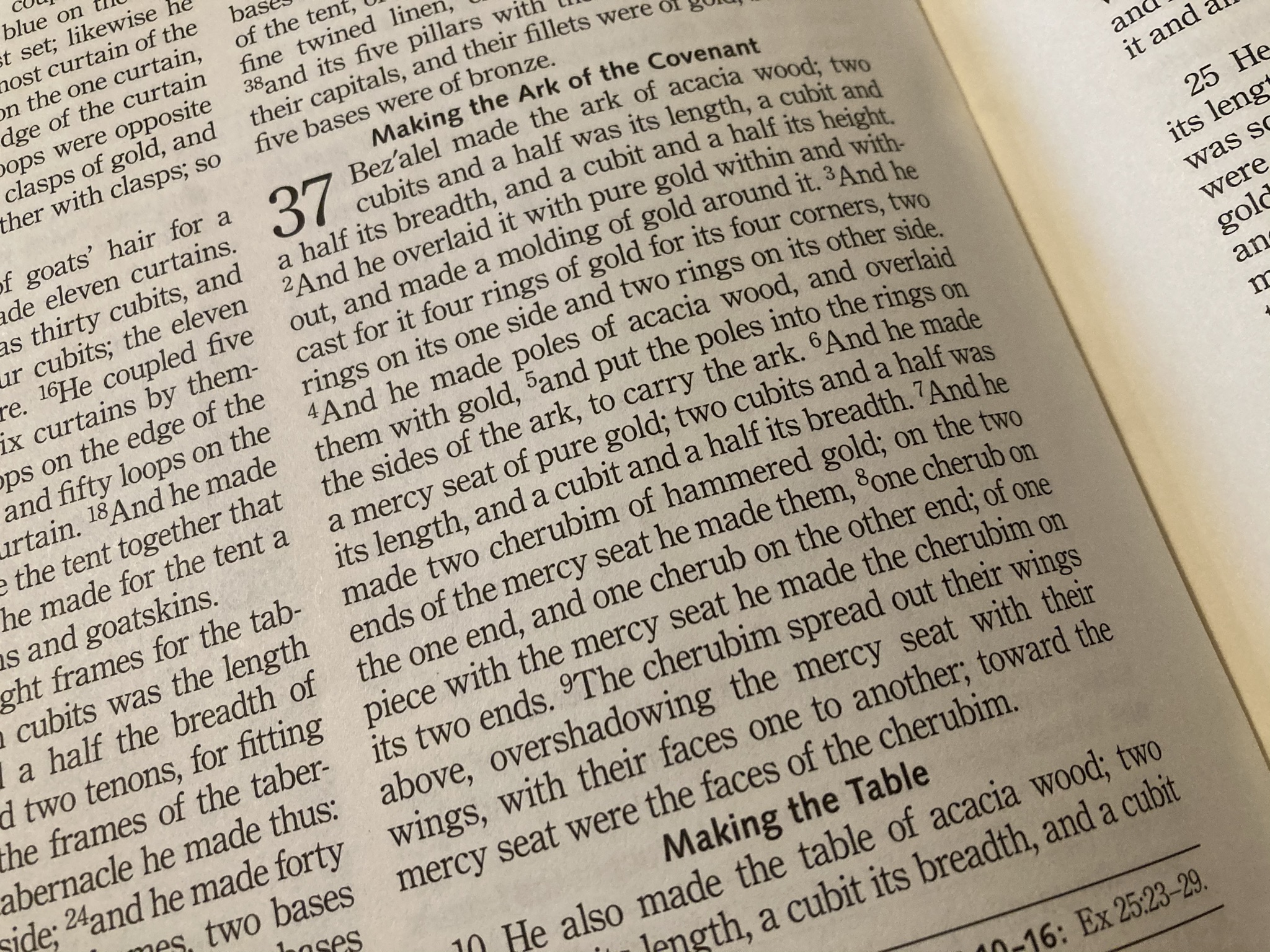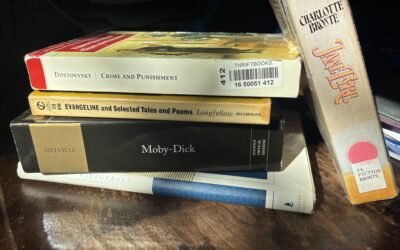For Realsies This Time

I thought I’d try Father Mike Schmitz’s Bible in a Year podcast.
This is not the first time I’ve tried the ole “Read the Bible in a Year” resolution. It’s probably the third or fourth try in as many years. I always start off strong with shouts of “This year, I’m going to make it!” but usually get bogged down in late January and by mid-February, I can’t even look God in the eyes.
After much study of the data (searching through my sometimes unreliable memory), I have narrowed it down to three problems that usually derail me from whatever Bible in a Year schedule I’m working on.
The first is that much of the bible was written during a very different time and in a very different cultural makeup than the one I currently live in so, I have no idea what is going on half the time. I end up with many unanswered questions:
- “Why is that woman insisting that her husband ‘lie’ with her maid?”
- “Why does that guy want his servant to put his hand under his thigh?”
- “Why did God have people paint their doors with blood in order to turn away the Angel of Death? It just seems a little macabre. Why not a sign that reads ‘Not Egyptian?’
Another reason I get bogged down is the Bible sometimes gets into minute details about things that, not being a detail-oriented person, I have no interest in. For instance, I tried really hard to pay attention as I read the exhaustive instructions God gave to build the Ark of the Covenant at the end of Exodus. “Why is this in the Bible?” I kept thinking. I know it was the word of God and, yes, everything God says is amazing. I’m sure that was one heck of an Ark of the Covenant once finished. But it seems like logic would dictate that if one were going to include absolutely everything God said, perhaps for readability, we could put the blueprints He handed down in some sort of appendix? That would avoid the abrupt halt to what had otherwise been a very exciting story.
Even if an enthusiastic Bible in a Year reader made it through the Lord inspiring the IKEA business model at the end of Exodus, they are met on the other side of it by Leviticus. The book that is the death knell for many a reading the Bible in a Year dream for it is a book of laws. Maybe if the book exactly after Leviticus was named “Really Exciting Battles” or “Genesis 2.0” or even “Exodus 2.0 minus the very detailed plans for building the Ark at the end,” it would be easier to slog through all the talk about blood and entrails and fat and kidneys and sin offerings with the promise of more electrifying reading coming up. But the book after “Leviticus” is named “Numbers.” “Numbers” is not the name of a book that most people are ecstatic to delve into after an entire book of laws.
I’m suspicious God named it that as a test of faith: “I need a name so boring that if they still read it, it will be entirely out of love for Me. I shall call it Numbers. Write that down, Moses.”
To this day, there are a statistical anomalous amount of accountants and bookies in Heaven.
The final reason I got derailed was there would always come a day in which I would be so tired that I would put off the readings until the next day. I’d have to double up to catch up, which wasn’t too difficult to do. So then I’d do it again after another tiring day and then again after a particularly busy day telling myself I’ll double up to catch up and then, I’ll triple up to catch up. Before I knew it, I’d have months of quadruple readings ahead of me in order to finish on time, I’d get overwhelmed and I’d give up.
Yet, despite my past Bible in a Year failures, I decided to try again. There had to be something about this book that made it so popular and I intended to find out what that something was. I suspected if I could just find a way to get through to Joshua, I’d have that feeling of having too much invested to want to give up.
So I enthusiastically began Father Mike’s podcast.
The podcast format has eliminated two of the three reasons I used to get bogged down. First, It keeps me on schedule. Even if I’m too tired to do the readings at the end of the night it doesn’t matter because Father Mike is doing them. It doesn’t seem like it should make much of a difference between reading the Bible and hearing the Bible read but it does make a big difference. I’m no brainiologist but my brain seems much more capable of processing the readings even while tired if someone else is reading them.
Second, Father Mike has excellent read-aloud skills. His voice is much better than my annoying, nasally internal reading voice. He makes the listener feel like you’re right there with the patriarchs as they dwell in tents, almost sacrifice their sons, leave town so their enraged brother doesn’t kill them and get sold into slavery only to rise through the ranks of Egyptian social class so that they are second only to thePharoah. His reading of Job makes the listener feel abandoned by God and annoyed with his friends. During his reading of the Psalms, the listener gets the feeling that if Father Mike had a harp, there’d be little difference between him and King David.
His storytelling talent is most on display when he reads the biblical minutiae without boring the listener to tears. He somehow makes it kind-of exciting. Well, maybe not exciting in a normal sense. It’s hard to make long lists of ancient names conventionally exciting. I mean exciting in the sense of a-platoon-leader-rallying-his-men-through-a-particularly-tedious-march-in-a-very-boring-landscape-in-order-to-get-to-the-exciting-battle exciting.
And he’s using the narrative order of the Great Adventure Bible Timeline so the more laborious books are paired up with the thrilling ones, making the tiresome ones much easier to endure.
At the end of each day’s readings, he usually offers a reflection and sometimes explanation if anything freaky-deaky went on in the reading. However, it would be impossible for him to go into too much detail about each reading so I have augmented the podcasts with the Saint Ignatious study bibles.
Do not read the Bible without a good study bible. I repeat: Do not read the Bible without a good study bible. When you read the Bible with the explanations of all the customs, history, meanings, allegory and connections to the New Testament, it’s like reading an entirely different book. It’s akin to taking an appliance manual and turning it into a best selling novel.
And all those questions that pop-up are generally answered.
- “In Ancient Near East culture, barren women had their husbands ‘lie’ with their maids as a form of surrogacy. They got to raise the maid’s child as their own.”
- “Putting your hand under someone’s thigh was an oath gesture. If you didn’t come through on your end, you would be cursed with sterility.”
- “God had the Jews paint their doors with blood because the Egyptians were not down with animal sacrifice in that they worshipped most of those animals as Gods. The Jews painting their doors with that blood would bring a death sentence on them, meaning that if they decided to follow God, there was no going back to their old life.”
I’ve finished Genesis and Job and have just started Exodus paired with Leviticus. Some Proverbs and Psalms have been sprinkled throughout each day.
I think this year I’m going to make it! It probably doesn’t hurt that society as we know it is collapsing, and so focusing on the Kingdom of God has never been easier. Given the choice between listening to Leviticus drone on and on about how to properly sacrifice an animal or listening to the culture drone on and on about masks, Leviticus doesn’t seem so tedious anymore. “Numbers” sounds downright fascinating.
Well played God. Well played.





I always love to read your blogs
Thanks!
As always, I totally enjoy your dissertation and love having you with me in this study!
Thanks for sending me that YouTube video to kick this all off.